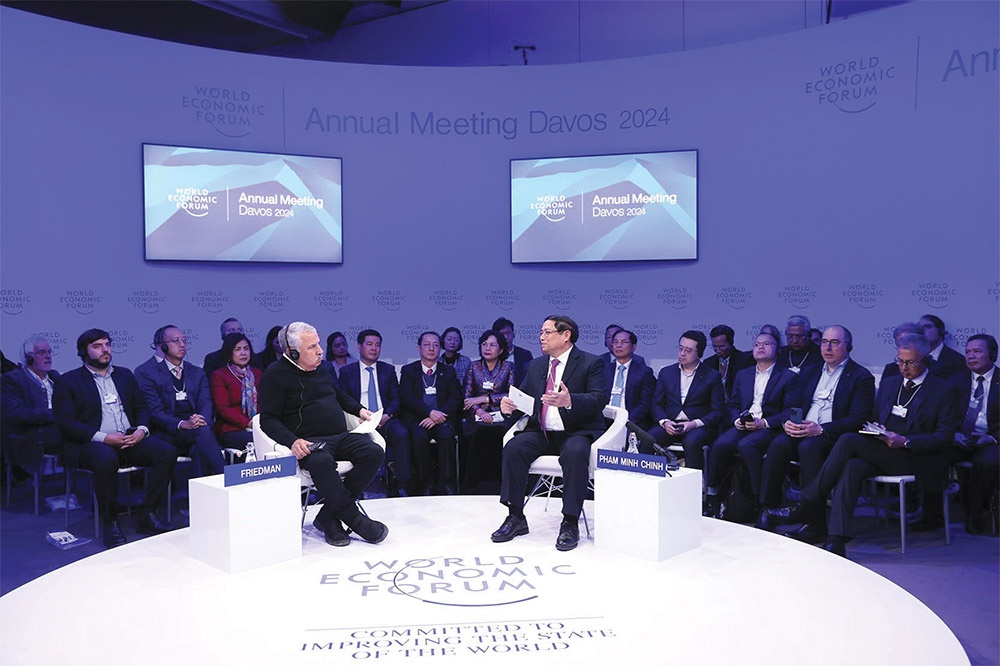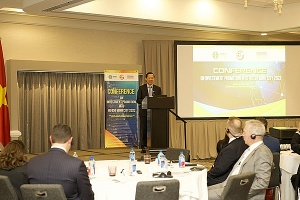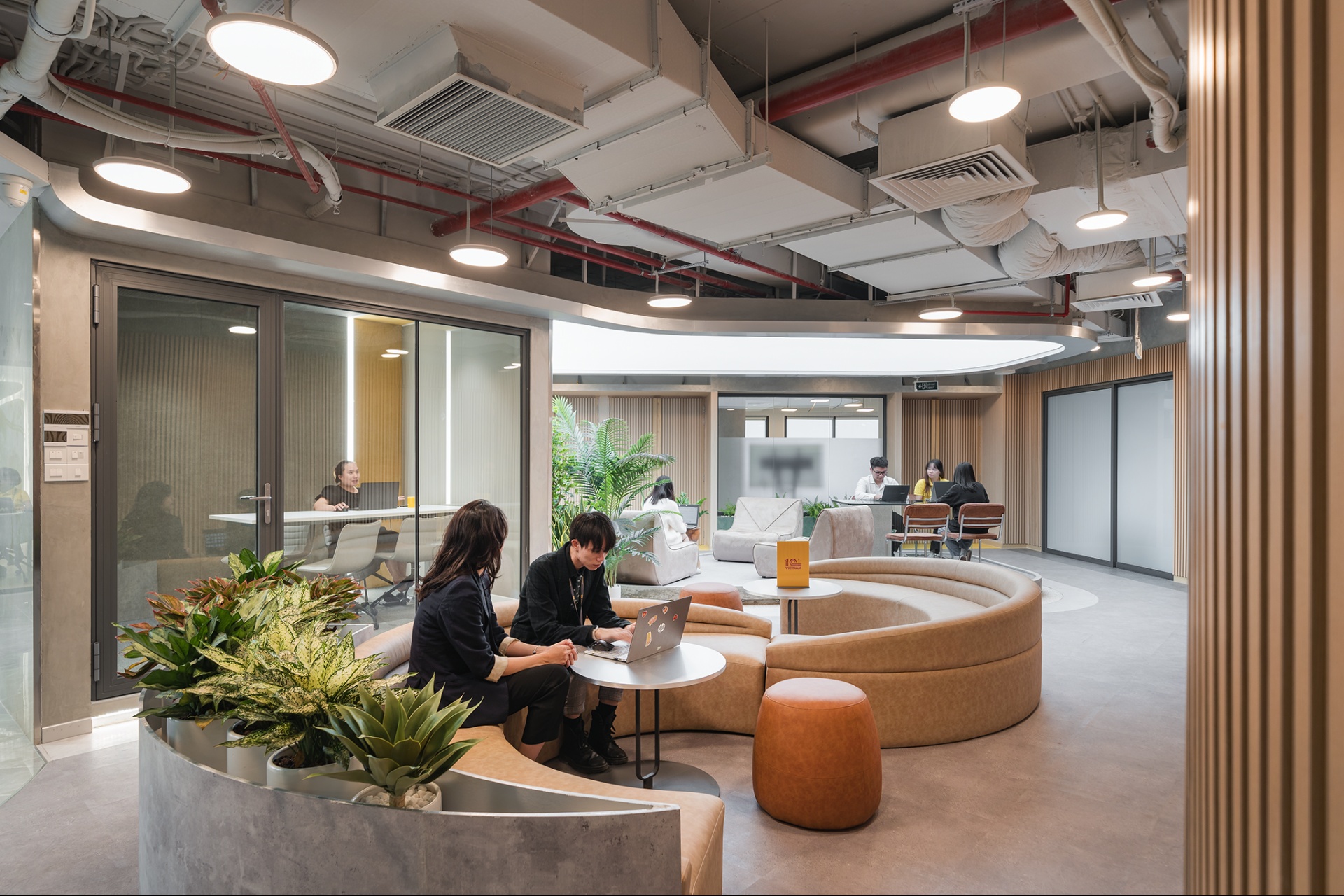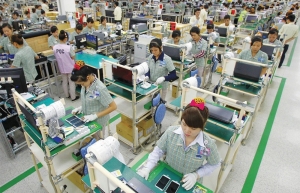Industry 4.0 era boost via high-tech partnerships
 |
| PM Pham Minh Chinh (right) spoke at a policy dialogue at the World Economic Forum last week, photo VNA |
At the 54th conference of the World Economic Forum (WEF) last week in Switzerland, Ho Chi Minh City People’s Committee and the WEF inked a partnership agreement on establishing the Fourth Industrial Revolution Centre in the city. In September 2023, both sides signed a cooperation statement that covered some content for the establishment of the centre.
According to Vietnam’s Ministry of Foreign Affairs, the centre will be part of the WEF’s global 4.0 network, and will increase cooperation with other centres of the types throughout the world in order to study proper solutions and breakthrough priorities for the city and for Vietnam as a whole. It will also be able to mobilise resources and capital to support the government and enterprises to apply the world’s latest technologies.
The cooperation means that Vietnam is being considered by the WEF as a focal point in Industry 4.0 policy in the region. The country will take the lead in developing relevant policies and be used for piloting new technologies, and applying public-private partnership models in order to create breakthrough products amid Industry 4.0.
Also last week, Vietnamese Prime Minister Pham Minh Chinh met with Klaus Schwab, founder and executive chairman of the WEF, proposing that it help Vietnam attract high-tech investment, especially for the energy transition, digital transformation, and strategic infrastructure.
PM Chinh also proposed that the WEF support Vietnam in policy consultancy in order to improve national competitiveness as well as the business and investment climate in line with global trends and regulations. Schwab underlined the WEF’s strong commitment to cooperating with Vietnam.
The WEF is the rendezvous of thousands of global groups, from Apple and Siemens to Mitsubishi and GE.
Vietnam and the WEF are currently implementing a public-private partnership agreement signed in 2017, becoming the first country in the world to ink such a deal with the forum. Under the pact, the WEF helps connect Vietnam with its top businesses, provides Vietnam with policy consultation on economic restructuring, high-tech agriculture, national competitiveness and climate change, and receives Vietnamese officials as apprentices at WEF units.
On the sidelines of COP28 in the United Arab Emirates in December, WEF president Børge Brende told PM Chinh that Vietnam is becoming a magnet to global investments thanks to its improved business climate.
A recent survey showed Vietnam is one of the world’s leading economies in attracting foreign direct investment, along with India and Mexico, Brende added.
The World Bank suggests that to tap into opportunities from Industry 4.0 in 2024 and beyond, Vietnam needs to grasp integrated digital solutions. Specifically, the government should adopt a holistic approach to how technology can support reforms for impact and transform its development outcomes.
For example, Estonia exploited Industry 4.0 opportunities at the start of its digital journey known as e-Estonia, and as a result has gained 2 per cent in its GDP. The system enables an Estonian to establish a company in just 18 minutes. With over 99 per cent of states services online, Estonia boasts of saving 800 hours of working time every year through the strategy.
| In June last year, Vietnamese Minister of Foreign Affairs Bui Thanh Son and WEF President Børge Brende signed an MoU between to cover 2023-2026. The deal is an important foundation to promote Vietnam-WEF cooperation. It focuses on six key areas: innovation in the food sector; developing skills for innovation and green transformation; industrial clusters towards net-zero emissions; promoting action on plastics; financing for renewable energy transition; and cooperation in digital transformation and promotion of the establishment of the Fourth Industrial Revolution Centre. The signing of the MoU will help Vietnam access international resources and experience, and participate in the WEF’s global programmes, thereby establishing a synchronous ecosystem to promote new growth drivers, attract investment, and improve national competitiveness. Source: Ministry of Foreign Affairs |
 | Vietnamese encouraged to return in high-tech roles Various opportunities in prominent fields in the country could help solidify the decision of Vietnamese living abroad to return to contribute to their homeland. |
 | Ho Chi Minh City seeks US investment in green and high-tech sectors Chairman of Ho Chi Minh City People's Committee Phan Van Mai has invited US corporations to invest in the sustainable and high-tech sectors, aligning with the city's green growth strategy for 2030 and beyond to 2050. |
 | Green and high-tech offices space becomes a trend Many companies are selecting offices with green certifications that cater to health, wellbeing, and environmental protection to meet and keep up with changing employee demands. |
 | South Korean giants expand investment in high-tech sphere South Korean groups are seeking to reinforce their footprints in a wide range of green and high-tech ventures in Vietnam. |
What the stars mean:
★ Poor ★ ★ Promising ★★★ Good ★★★★ Very good ★★★★★ Exceptional
 Tag:
Tag:
Related Contents
Latest News
More News
- Hermes joins Long Thanh cargo terminal development (February 04, 2026 | 15:59)
- SCG enhances production and distribution in Vietnam (February 04, 2026 | 08:00)
- UNIVACCO strengthens Asia expansion with Vietnam facility (February 03, 2026 | 08:00)
- Cai Mep Ha Port project wins approval with $1.95bn investment (February 02, 2026 | 16:17)
- Repositioning Vietnam in Asia’s manufacturing race (February 02, 2026 | 16:00)
- Manufacturing growth remains solid in early 2026 (February 02, 2026 | 15:28)
- Navigating venture capital trends across the continent (February 02, 2026 | 14:00)
- Motivations to achieve high growth (February 02, 2026 | 11:00)
- Capacity and regulations among British areas of expertise in IFCs (February 02, 2026 | 09:09)
- Transition underway in German investment across Vietnam (February 02, 2026 | 08:00)




















 Mobile Version
Mobile Version